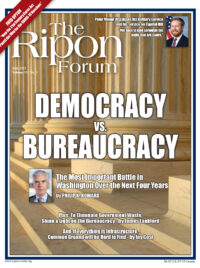
The Biden Administration has made infrastructure spending a top priority of its first-year agenda, and prospects seem surprisingly good for a bipartisan deal. It actually seems possible, even in this age of hyperpolarization, that the two sides might come together on some kind of agreement. But what sort of package should Republican lawmakers accept? While both sides generally support infrastructure spending, they have strikingly different reasons for doing so. And Republicans should insist on a package that facilitate the party’s top priority of economic development.
The GOP’s commitment to infrastructure spending goes back to the very origins of the party. The Lincolnian Republicans were at first a hodgepodge collection of disparate groups opposed to the spread of slavery, but the dominant force within that early coalition was the remnant of northern Whigs. A cornerstone of Whig policy was spending on what they often called “internal improvements,” which the party viewed as essential to regional integration and economic development. In the 19th century, it was the Republicans who spearheaded federal support of railroad development, including the transcontinental railroad. In the 20th century, Republican President Dwight Eisenhower initiated the Interstate Highway System. Though the GOP has evolved a great deal since its beginnings, infrastructure has remained a Republican priority because the party still stands for those 19th century ideas of promoting private sector development and linking disparate parts of the country together.
Because Democrats view infrastructure spending in part as a way to transfer wealth from the rich to the poor, they have no problem raising taxes to finance such projects.
The Democratic path toward support for infrastructure was markedly different. Generally opposed to such programs prior to the Civil War, in their Jacksonian belief that the Constitution prohibited them, the party only embraced it in the 20th century as part of its reorientation toward an expansive vision of the central state. Franklin Roosevelt’s New Deal enacted massive expenditures on infrastructure, but then again it enacted massive expenditures on virtually every imaginable policy program. Importantly, Democratic motivation for infrastructure spending was (and is) different than the GOP’s. While the party has historically touted infrastructure spending to promote economic development, the social welfare aspect is at least as important. The New Deal was not simply about building roads and buildings and clearing forests, it was about putting unemployed men to work to accomplish those tasks.
The difference in party motives remains to this day and is evident on several specific political debates. A good example is the continued divide over the Davis-Bacon Act of 1931, which mandated that projects on public works that receive federal funds must pay workers the local “prevailing wage.” Democrats, spurred on by their allies in the construction unions, strongly favor the act, while Republicans generally believe it should be repealed. The former see it as a form of redistributive public policy while the latter see it as interfering with the efficiency of federal spending.
An even more substantial point of division between the two parties is how to pay for such programs. Because Democrats view infrastructure spending in part as a way to transfer wealth from the rich to the poor, they have no problem raising taxes to finance such projects. But because most Republicans primarily see infrastructure as a means to economic development, they see tax increases as a self-defeating form of financing, as it takes capital out of the private sector, where it is best directed for growth. Instead, Republicans usually prefer to finance infrastructure through spending cuts, which are anathema to the Democratic agenda.
But because most Republicans primarily see infrastructure as a means to economic development, they see tax increases as a self-defeating form of financing, as it takes capital out of the private sector, where it is best directed for growth.
So as an issue, infrastructure is one where the devil is most definitely in the details. There seems in general to be common ground between the two sides, but philosophically the parties have notably different reasons for supporting increased spending.
If anything, the divide between the parties has only grown greater in the last few years, as the Democrats have moved substantially to the left. Moderate Democrats are fewer and farther between, while socialist Bernie Sanders is the chairman of the Senate Budget Committee, an important perch from which to influence domestic policy. Many in the party now seek to redefine “infrastructure” as a catchall term for their entire agenda. The expansion of a cradle-to-grave welfare state, from new programs on childcare to an expansion of Medicare, is now “human infrastructure.” The Green New Deal, with its massive transfer of wealth based on magical notions of a carbon-free economy, is likewise now “infrastructure.” And buried deep within the Biden Administration’s infrastructure plan are all kinds of goodies for labor unions and restrictions on what policies states who accept federal dollars can actually accomplish. Destroying federalism is apparently now infrastructure in the Democratic mind.
As bipartisan negotiations over an infrastructure package continue this summer, Republicans should be mindful of their bottom line as a coalition. Any bill that hopes to have Republican support has to focus on physical infrastructure that facilitates regional integration and above all economic development. That is why the party supports such spending, and it should be its sine qua non in any negotiations. If Democrats insist on redefining the term “infrastructure” to include their redistributive agenda, Republicans should walk away from the bargaining table and instead take the issue to the voters in 2022.
Jay Cost is the Gerald R. Ford nonresident senior fellow at the American Enterprise Institute (AEI), where he focuses on elections, politics, and public opinion.




